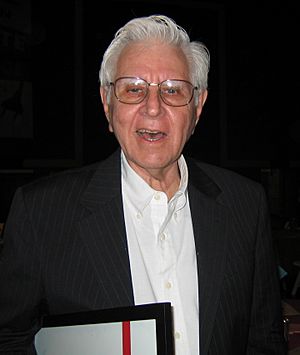Rodolfo Acuña facts for kids
Rodolfo "Rudy" Francisco Acuña (born May 18, 1932) is an American historian, professor emeritus at California State University, Northridge, and a scholar of Chicano studies. He authored the 1972 book Occupied America: A History of Chicanos.
Contents
Early life and education
Acuña was born in Los Angeles, California, in 1932 to Alicia Elías who was from Sonora, Mexico. His father was from Cocula, Jalisco.
Acuna received his bachelor's and master's degrees from Los Angeles State College, now known as California State University, Los Angeles, and later earned his PhD in History from the University of Southern California (USC).
Career
In 1958, Acuña began teaching at San Fernando Junior High, transferring later to Cleveland High School, where he taught social studies until 1965, when he received a tenured position at Los Angeles Pierce College. He also taught adult high school to pay for his doctoral studies at the University of Southern California, during which time he was active with the Latin American Civic Association and the Mexican American Political Association. He was the founding chair of the California State University, Northridge's Chicano/a Studies department, and he began teaching at the university in 1969.
In 1989, Acuña was a founding member of the Labor/Community Strategy Center, a civil rights advocacy group. Two years later, he traveled to El Salvador as a correspondent for the Texas Observer covering its presidential elections. He had sought to know "how accurate were the interpretations of historians of the past." His books and lectures analyze this query.
Lawsuit
In 1992, Acuña sued the University of California, Santa Barbara, for 'discrimination'. The judge dropped the race discrimination cause of action. The political cause of action had previously been dropped because it missed the statute of limitations filing. A jury stated that Acuña had been discriminated against on the basis of his age, but Federal Judge Audrey Collins refused to compel the university to hire him, instead awarding him a monetary compensation of $325,000, which Acuña states that he and his wife will use to help the victims of employment discrimination in higher education. The For Chicana Chicano Studies Foundation recently launched a web site. The foundation gives an average of $7,500 annually in scholarships.
Legacy
Acuña's archives are held in the Special Collections and Archives section of the Library at California State University, Northridge.
Honors
- Outstanding Academic Title by CHOICE Magazine for Corridors of Migration: The Odyssey of Mexican Laborers, 1600–1933, 2009
- National Hispanic Institute, Lifetime Achievement Award, Austin, Texas, 2008
- Community Coalition South Central Los Angeles, 9th Annual Gala Dinner, Activist-scholar award, 2008
- The Labor/Community Strategy Center Award, May 2007
- Center for the Study of Political Graphics (CSPG), Historian of the Lions Award at 18th Anniversary Dinner in Los Angeles on Saturday, October 13, 2007
- National Hispanic Hero Award, March 11, 2006, Chicago, 24th Annual National Conference. United States Hispanic Leadership Institute,
- LA Weekly LA People 2006, April 21–27, 2006, p. 108, Featured as one of 100 LA shakers and movers
- Symposium on the Works of Rodolfo F. Acuna, California State Northridge, May 2005
- Selected As One of the "100 Most Influential Educators of the 20th Century," Black Issues In Higher Education
- Recipient of the Gustavus Myers Award for an Outstanding Book on Race Relations in North America
- Distinguished Scholar Award, National Association of Chicana and Chicano Studies
- Homenaje University of Guadalajara Feria Internacional del Libro de Guadalupe and the State of Guadalajara Mexico for the Outstanding Scholar of U.S.-Mexico Studies
- Emil Freed Award for Community Service, Southern California Library for Social Studies and Research
- Founder's Award for Community Service, Liberty Hill Foundation
- American Council of Learned Societies Award
- Rockefeller Humanities Fellowship


